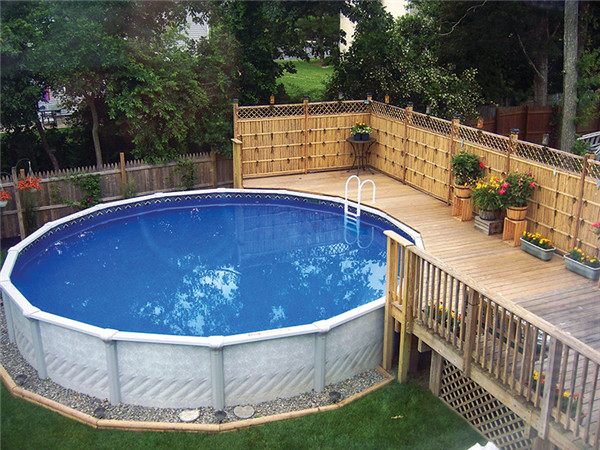- Product Knowledge
Inground Pools vs Above Ground Pools: Which One Should You Choose?
So, you’ve got this dream of adding a pool to your home. But now comes the big decision: inground or above ground? It’s like choosing between a sleek convertible and a sturdy SUV. Let’s dive into the details and make some waves in your decision-making process.
Understanding Inground Pools

What Makes Inground Pools Unique?
Inground pools are exactly what they sound like – pools that are built into the ground. They offer a seamless and luxurious addition to any backyard space, providing endless opportunities for relaxation and entertainment.
1. Types of Inground Pools
There are several types of inground pools to choose from, including:
Concrete Pools: These pools are constructed by spraying concrete onto a steel frame, providing durability and versatility in design.
Vinyl Liner Pools: Featuring a vinyl liner stretched over a metal or plastic frame, these pools offer a smooth and customizable surface.
Fiberglass Pools: Made from a single piece of fiberglass that is molded into shape, these pools are known for their quick installation and low maintenance.
Pros of Inground Pools
Aesthetics: Inground pools offer a seamless and elegant look that enhances the overall appeal of your backyard.
Customization: From shape and size to features and finishes, inground pools can be fully customized to suit your preferences.
Durability: With proper maintenance, inground pools can last for decades, providing long-term enjoyment for you and your family.
Property Value: Adding an inground pool to your home can increase its value and appeal to potential buyers.
Cons of Inground Pools
Cost: The initial cost of installing an inground pool is often higher compared to above ground options, and ongoing maintenance expenses should also be considered.
Installation Time: Depending on the type of pool and complexity of the design, the installation process for inground pools can take several weeks to complete.
Permanent Fixture: Once installed, inground pools are difficult to remove or relocate, limiting your flexibility in the future.
Exploring Above Ground Pools

What Sets Above Ground Pools Apart?
Above ground pools are a popular choice for homeowners looking for a more affordable and versatile option. These pools sit above the ground surface and come in a variety of shapes, sizes, and materials.
1. Types of Above Ground Pools
Steel Pools: Known for their strength and durability, steel pools are a popular choice for above ground installations.
Aluminum Pools: Lightweight and corrosion-resistant, aluminum pools offer ease of installation and maintenance.
Resin Pools: Made from a combination of resin and plastic, these pools are durable and resistant to rust and corrosion.
Pros of Above Ground Pools
Affordability: Above ground pools are typically more budget-friendly than inground options, making them accessible to a wider range of homeowners.
Portability: Unlike inground pools, above ground pools can be dismantled and relocated if needed, providing greater flexibility.
Ease of Installation: With their simple design and modular construction, above ground pools can be installed quickly and with minimal disruption to your backyard.
Low Maintenance: Due to their smaller size and above ground location, these pools often require less maintenance and upkeep compared to inground options.
Cons of Above Ground Pools
Aesthetics: While above ground pools have come a long way in terms of design, they may still lack the visual appeal of inground options.
Limited Size and Depth: Above ground pools are typically smaller and shallower than inground pools, which may not be suitable for serious swimmers.
Durability Concerns: Depending on the material and construction quality, above ground pools may be prone to damage from weather and wear over time.
Comparing Pool Lighting Options
Illuminate Your Pool Experience
Both inground and above ground pools offer a variety of lighting options to enhance your swimming experience and create the perfect ambiance for poolside relaxation.
1. Inground Pool Lighting
Surface Mounted Lights: These lights are installed flush with the pool surface, providing even illumination and a sleek look.
Recessed Lights: Recessed lights are installed into niches within the pool walls, creating a subtle and elegant lighting effect.
LED Pool Lights: Energy-efficient and long-lasting, LED lights are a popular choice for inground pools, offering a range of colors and effects.
2. Above Ground Pool Lighting
Magnetic Lights: These lights attach to the pool wall magnetically and can be easily repositioned as needed.
Floating Lights: Floating lights are placed on the surface of the water and can add a fun and festive touch to your pool area.
Solar-Powered Lights: Environmentally-friendly and cost-effective, solar-powered lights harness the power of the sun to illuminate your pool at night.
When it comes to choosing between inground and above ground pools, there is no one-size-fits-all answer. It ultimately comes down to your budget, space constraints, and personal preferences. Whether you opt for the luxury of an inground pool or the affordability of an above ground option, the most important thing is to create a space that brings joy and relaxation to you and your loved ones.



